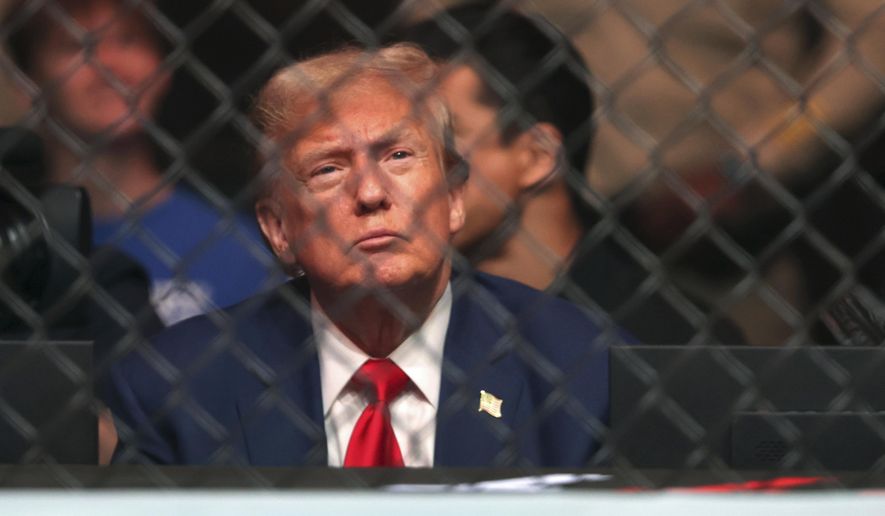Special counsel Jack Smith disclosed in court filings that he retrieved data from former President Donald Trump‘s smartphone, potentially crossing what critics call a “red line” for presidential immunity.
Mr. Smith revealed that his investigators extracted data from Mr. Trump‘s smartphone and he intends to use the records as evidence in his prosecution of the former president for election interference.
Mike Davis, founder and president of the Article III Project, said the seizure of Mr. Trump‘s cellphone data “crosses a red line” in terms of executive privilege and will have a chilling effect on future administrations.
“This sets a destructive precedent for the presidency, as it seriously undermines the president’s ability to get his constitutionally protected, confidential and candid advice from his advisers,” he said.
The issue of presidential immunity hangs over Mr. Smith‘s prosecution of Mr. Trump for allegedly interfering in the 2020 election and inciting the Capitol riot.
Mr. Trump claims that presidential immunity shields him from criminal charges because the events took place while he was commander in chief. His motion to dismiss the charges due to presidential immunity was kicked to the D.C. Circuit Court of Appeals, where it remains after the Supreme Court rejected Mr. Smith‘s bid for the justices to fast-track a final decision.
SEE ALSO: California keeps Trump on the ballot
If the election interference case proceeds to trial, Mr. Smith likely will try to show jurors the smartphone data revealing when Mr. Trump‘s phone was “unlocked and the Twitter application was open” during the hours of the Jan. 6, 2021, riot at the Capitol.
Previous court rulings offer little insight into whether a president’s electronic communications can be privileged and, therefore, shielded from prosecutors, or if Mr. Smith opened the floodgates for access to that data.
In 1974, the Supreme Court ruled that President Nixon did not have immunity privileges to withhold audio tapes of conversations he recorded in the Oval Office. The court held that a president does not have executive privilege when it comes to immunity from subpoenas or other court actions.
That ruling suggested Mr. Smith‘s seizure of Mr. Trump‘s electronic data is legally sound.
However, the Supreme Court in 2018 concluded that warrantless search and seizure of cellphone records, which includes the locations of movements of the phone user, violate the Fourth Amendment.
The decision could give Mr. Trump an avenue to challenge the use of his phone data at trial.
“The phone records may add to the unease of some judges and justices over the fight over presidential immunities and privileges,” said Jonathan Turley, who teaches Constitutional Law at George Washington University.
“However, Smith has the Nixon case to cite for such demands in the investigation of possible criminal acts. What is clear is that the Court may be pushed into a major line-drawing decision over inherent presidential immunities,” he said.
Jamil Jaffer, former associate White House counsel to George W. Bush, said the use of presidential cell phone data “raises really hard, complex questions on an unprecedented set of facts.”
Other legal experts seemed to agree that Mr. Smith‘s disclosure was bad news for Mr. Trump.
Harry Litman, a constitutional law professor at UCLA, said the revelation should have Mr. Trump‘s legal team “totally freaked out.”
“Experts apparently can figure out through Twitter data not just what Trump tweeted and visited but his physical whereabouts and others who used his phone. Gulp!,” he wrote on X.
In court filings, Mr. Smith said a person identified as “Expert 3” extracted and processed data from the White House cellphones of Mr. Trump and someone identified as “Individual 1.”
Individual 1 is believed to be former New York Mayor Rudolph W. Giuliani, who served as Mr. Trump‘s lawyer during the time. A spokesperson for Mr. Giuliani did not respond to a request for comment.
The filing also says that Expert 3 “reviewed and analyzed data on the defendant’s phone and on Individual 1’s phone, including analyzing images found on the phones and websites visited.”
Earlier last year, it was revealed that Mr. Smith‘s team obtained location data and draft tweets from the president after a legal battle with Twitter, now known as X. The company attempted to block the prosecutor’s effort. The social media giant ultimately lost the court battle and handed over an extensive list of data related to Mr. Trump‘s account, including all tweets “crafted, drafted, favorited/liked or retweeted.”
Mr. Trump pleaded not guilty to four federal charges in the election interference case: conspiracy to defraud the United States, conspiracy to obstruct an official proceeding, obstruction of and attempted to obstruct an official proceeding and conspiracy against the rights of voters.
• Jeff Mordock can be reached at jmordock@washingtontimes.com.




Please read our comment policy before commenting.